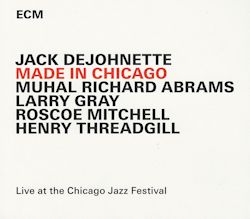-
Chant
-
Jack 5
-
This
-
Museum Of Time
-
Leave Don't Go Away
-
Ten Minutes
Henry Threadgill - Alto sax, bass flute
Roscoe Mitchell - Sopranino, soprano, alto sax, baroque flute, bass recorder
Muhal Richard Adams - Piano
Larry Gray - Double bass, violoncello
Jack DeJohnette - Drums
It is possible that some jazz followers will associate Jack DeJohnette primarily with his work for Keith Jarrett's Standards Trio, from 1983 up to
the present day. However, the Chicago born drummer is notable for much more than that. Over the years, he has played and/or recorded with a
veritable galaxy of jazz greats such as John Coltrane, Charles Lloyd, Miles Davis (including the Bitches Brew recording date) and Stan
Getz, always with great distinction. On this CD, DeJohnette returns to his roots and to the company of musicians that, for the most part, he has
known since his youth. DeJohnette, Mitchell and Threadgill were at school together in Chicago's Southside and were subsequently to join Muhal
Richard Abram's Experimental Band, an early free-jazz outfit. Collectively they became involved with the Association for the Advancement of
Creative Musicians (AACM). This August 2013 live concert reunited the group at Chicago's Millennium Park with the addition of double
bassist/cellist Larry Gray. It features compositions by Mitchell (twice), Abrams, DeJohnette and Threadgill, plus a final track which all five
musicians wrote together.
My favourite among the offerings here is undoubtedly Jack 5 with a stylish drum intro for DeJohnette (superb throughout) and with
Threadgill and Mitchell combining well on the moody theme. On this distinctly blues-influenced piece, there is quality bass playing from Gray too. This is something of a contrast, neoclassical in flavour, baroque and bass flutes to the fore, along with the violoncello. Deeply
ruminative. There are some neat chord progressions to be heard from Abrams on Museum of Time. Ten Minutes is busy, urgent and
oblique. The energy and technique of the artistes is admirable and Threadgill and Mitchell collaborate effectively on a range of instruments.
Nevertheless, I confess to feeling adrift at times, particularly during the opening track Chant which at certain points was, for me at
least, chaos personified. I found it difficult to warm to Leave Don't Go Away where the 'tricky funk syncopations' referred to in the
accompanying booklet totally escaped me. My guess is, however, that lovers of free jazz will find this right up their street. Certainly the
audience were enthused. By the way, ECM are to be congratulated for the aforementioned booklet which is informative and beautifully produced with
some great colour photographs of the band.
James Poore
